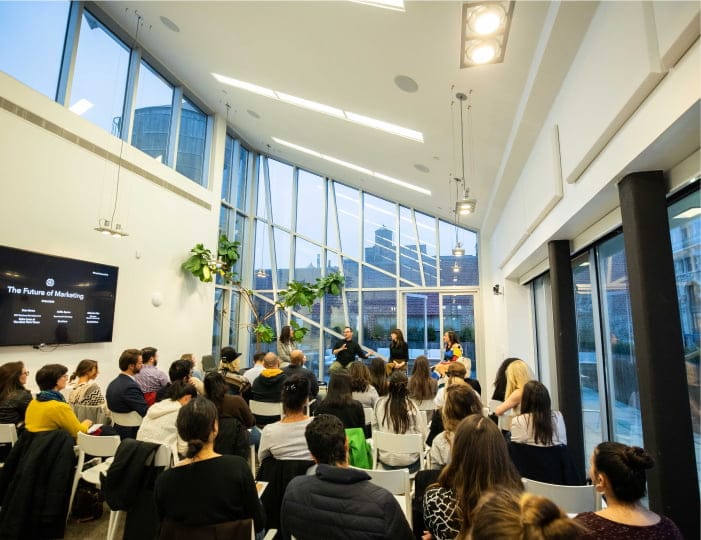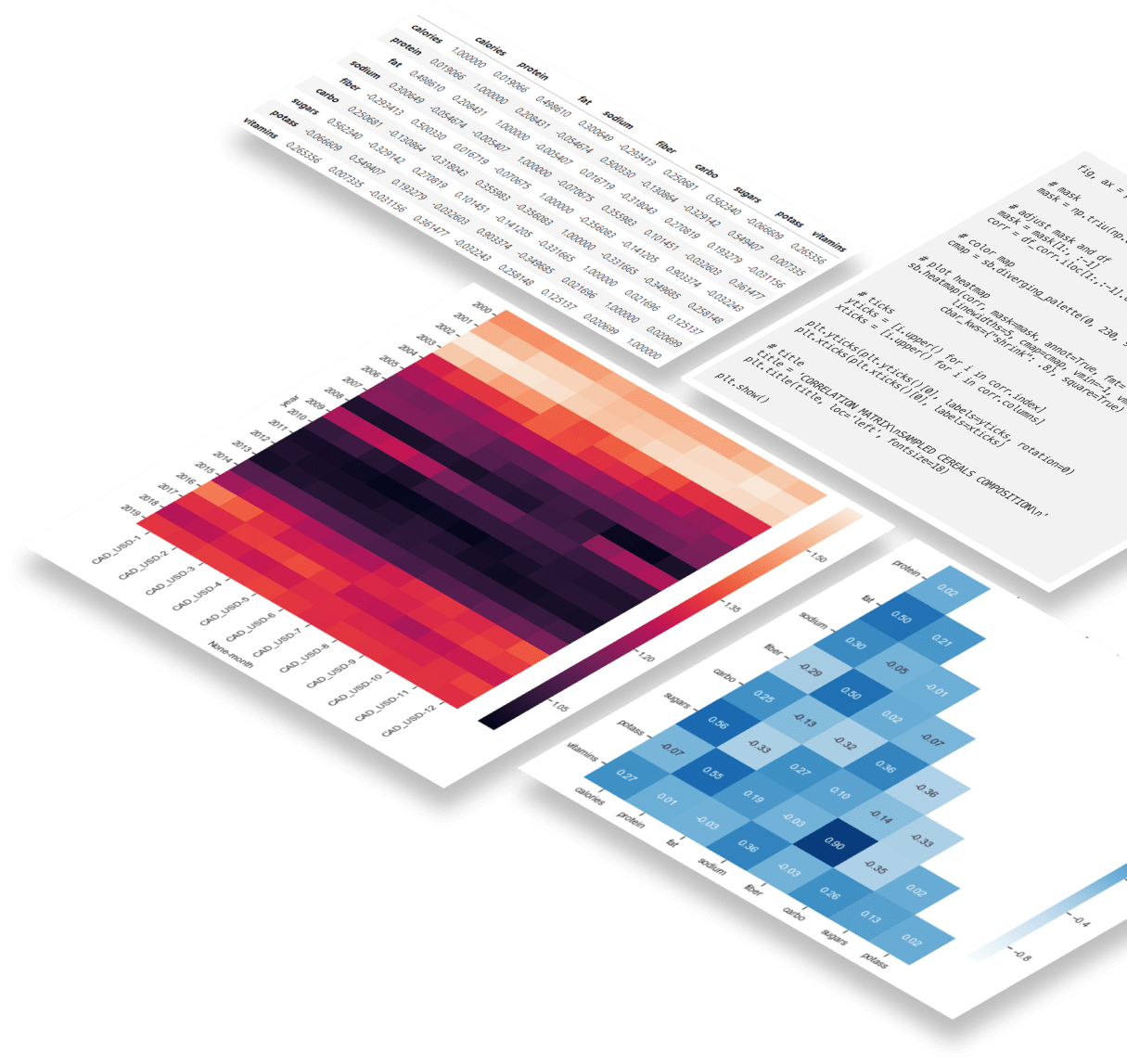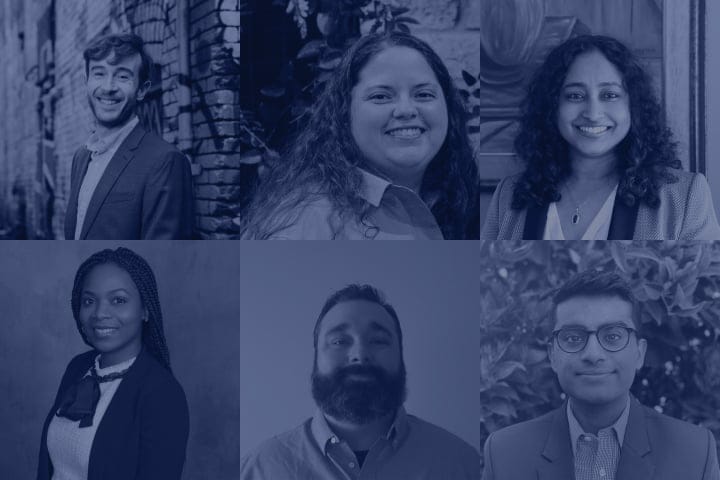- BrainStation
- New York
- Data Science Course

PROFESSIONAL CERTIFICATION
Data Science Course NYC
BrainStation’s Data Science course was created to help you develop job-ready data skills. Earn a Data Science certificate while learning the foundations of data science, how to create dynamic data visualizations, data modeling, machine learning techniques, Python for data analysis, and more.
View the Course Package to access:
- Tuition details and scholarships
- Financing options
- Employer sponsorship
The Instructors are very knowledgeable, but they’re also passionate about what they’re doing and that's the best way to share their knowledge and experience.
Mohamed Touré
Data Scientist at Shopify

Learn Data Science in New York
With the rise of big data, top companies around the world need teams of Data Scientists to collect, organize, model, and examine large amounts of data. In BrainStation’s data science courses, you will learn the foundations of data science and perform an end-to-end statistical analysis, learn to make data-driven predictions, and present results in a data visualization.
Learn Data Science in New York
Online classroom. Live and expert-led.
Build Data Science Skills
Ideal for learners looking to upskill.
Get Ready For Data Science Jobs
Build an interview-ready data science portfolio project.
Data Science Certification
Earn a BrainStation Data Science Certificate.






Data Science Courses
Ready to start learning data science? Take BrainStation’s data science courses online or in-person at any of BrainStation’s campuses. See below for our list of upcoming data science courses.
| Class Dates | Class Times | Instructor | |
|---|---|---|---|
|
Aug 15 - Oct 3 August 15 - October 3 8 Thursdays |
|

Data Leader at Meta |
Enroll Now |
|
Sep 17 - Nov 5 September 17 - November 5 8 Tuesdays |
|

Data Leader at Google |
Enroll Now |
|
Oct 24 - Dec 19 October 24 - December 19 8 Thursdays |
|

Data Leader at Meta |
Enroll Now |



| Class Dates | Class Times | Instructor | |
|---|---|---|---|
|
Jul 31 - Sep 18 July 31 - September 18 8 Wednesdays |
6:30pm - 9:30pm EDT | ||
|
Sep 18 - Nov 6 September 18 - November 6 8 Wednesdays |
6:30pm - 9:30pm EDT |

Data Leader at RBC |
Enroll Now |
|
Oct 22 - Dec 10 October 22 - December 10 8 Tuesdays |
6:30pm - 9:30pm EDT |

Senior Manager, Analytics at RBC |
Enroll Now |
|
Dec 4 - Feb 5 December 4 - February 5 8 Wednesdays |
6:30pm - 9:30pm EST |
To Be Announced |
Enroll Now |

Unit 1
Introduction to Data Science
The Python programming language has emerged as an essential tool for Data Scientists. In the first unit of BrainStation’s Data Science certification course, you will learn Python for data science through a series of hands-on data science projects. You will learn data manipulation techniques, how to analyze data, and how to use NumPy, Pandas, and the best Python libraries for data science, helping you to build a strong foundation for what you’ll learn throughout the rest of the Data Science course.
-
-
-
-
-
- Key Skills:
- Python Coding
- Data Manipulation
- Data Organization
- Programming Fundamentals
Python for Data Science
Python is one of the most important tools for a Data Scientist. Through real-world projects, quickly get up to speed with the Python and programming basics you'll need in the field of data and as a future Data Scientist.
Python Libraries for Data Science
Learn how to apply Python packages like NumPy and Pandas to perform practical, real-world data analysis and uncover business analytics insights.
Data Analysis Techniques
Discover how a Data Scientist can integrate different data sets in order to discover new actionable insights by using techniques such as joins, sorting and grouping, and transforming and aggregating.
Unit 2
Data Wrangling and Data Cleaning
A Data Scientist requires great data to perform great data analysis. Learn data cleaning and data wrangling techniques to ensure your data is organized, structured, and consistent. Learn to translate raw data into interesting data visualizations, and use Python packages to facilitate additional statistical analysis, so you can understand how to tell a story with data and get the most out of your work.
-
-
-
-
- Key Skills:
- Data Analysis
- Data Wrangling
- Data Visualization
Beautiful Data Visualization
Using Python packages, learn to create different types of data visualization. Understand the use cases for different data visualization examples so you know when to use them.
Prepare Data
Learn the essentials of data cleaning and data wrangling so you can prepare your data sets for statistical analysis, modeling, and decision making.
Unit 3
Data Modeling
Review important statistical analysis concepts and learn how they apply to data modeling and decision making. Using real data problems encountered in the data science field, learn to build both linear and categorical models, and understand when to use them. Practice applying these techniques to create data models that help you make a predictive analysis.
-
-
-
-
-
- Key Skills:
- Statistics
- Data Relationships
- Hypothesis Testing
- Data Modeling
- Python Data Visualization
- Predictive Analytics & Extrapolation
Statistics for Data Science
Review statistics foundations like the measures of central tendency and dispersion, covariance, and correlation, and understand how to incorporate them into your data analysis.
Hypothesis Testing
Practice how Data Scientists perform hypothesis testing as part of their exploratory data analysis. Learn how to calculate and apply statistical significance, and more.
Data Models
Learn different modeling techniques for numerical and non-numerical data. Build and run various types of data science models on real datasets to uncover patterns and make predictions.
Unit 4
Introduction to Machine Learning
Machine learning has emerged as a truly disruptive technology and data science capability. Discover common machine learning techniques and machine learning algorithms, and learn how they’re applied in practical, real-world scenarios.
-
-
-
-
-
- Key Skills:
- Machine Learning Fundamentals
- Data Classification Models
- Decision Trees
- Model Evaluation
- Categorical Predictions
Machine Learning Basics
Discover what machine learning is and how to apply it effectively within the real world. By understanding the constraints and applications of machine learning, you’ll be prepared to identify opportunities to implement it.
Machine Learning Models
Learn a variety of machine learning methods and machine learning algorithms, along with the scenarios they are used in. Explore models like decision trees, Naive Bayes classification, regression model evaluation, cross-validation, and more.
Data Scientist Course Instructors
Instructors in BrainStation’s data science courses are experienced data professionals who work at the world's most innovative companies. In our data science classes, you’ll learn from experts who have years of data industry experience and who know the most up-to-date and practical data skills companies around the world are looking for.
Industry-Led Data Science Training
BrainStation partners with industry experts when building all of our courses, ensuring every course covers the latest industry-relevant topics and tools businesses need. We continue to work with our network of experts to update our courses so they're always up to date.
Build Your Data Science Portfolio
Showcase everything you’ve learned with a unique Data Scientist portfolio project by completing a real-world analysis on a data set of your choosing. Every week you’ll be provided with clear steps to develop your final data science project. By the end of the Data Science course, you’ll have used programming to collect data and complete data wrangling, developed a hypothesis, and modeled your data to prove or disprove it. Finally, you’ll construct a data visualization to present your insights in a meaningful way.

View Tuition, Financing Options, and More in the Course Package
View the Course Package to access:
- Tuition details and scholarships
- Financing options
- Employer sponsorship
Earn a BrainStation Data Science Certificate
Upon completing BrainStation’s Data Science Course, you’ll receive an industry-recognized professional certificate to share with your network and showcase all that you’ve learned. BrainStation certificates are formatted for sharing on LinkedIn.


Location
Learn in the Center of NYC
Located in the heart of the tech & retail district of SoHo Manhattan, BrainStation is at the center of New York’s cultural and tech scene, surrounded by the best tech companies in NYC. In addition to courses, BrainStation New York offers training sessions, industry events, expert panel discussions, and more.
136 Crosby St, 4th Floor, New York, NY, 10012
What Our Graduates Are Saying

Dylan Hebb
Senior Consultant at Content Bloom
When you take a BrainStation course, you're learning with some of the very best in the industry. You collaborate with product managers, digital strategists, UX designers, and all kinds of other backgrounds.
#brainstation #BeFutureProof #LearningAtBrainStation #remotelearning

Andrew Gosine
Product Designer
Our instructor... was clear, detail oriented, and made the learning environment safe and collaborative. We got a lot of real world examples from him, and all the little details he shared made this entire course special, and more than simply reading a textbook.
Overall, I'm a big advocate for Brainstation's courses - they've proved to be extremely valuable in my career.


Mohamed Touré
Data Scientist at Shopify
Everyone who wants to achieve a career goal, learn a new skill, or gain more knowledge in a certain field should not be afraid to take the next step. Taking a course at BrainStation is a great opportunity – the skills you’ll learn are very practical and the learning experience and environment are made for professionals who really want to learn.
Read Full Testimonial
Aiden Feltkamp
The data science course is great... Through this class, I learned how to clean and model data, which is the basics of machine learning. The teachers were fantastic and they related everything to practical use. It's fast-paced, but the teachers are great at keeping you up to speed. I would highly recommend this class to anyone who's looking to start on machine learning and data modeling.


Join our growing community of 15,000+ alumni.
Data Science Certification FAQs
-
Will I earn a Data Science certificate from this course?
Yes, when you complete the Data Science course, you will earn a BrainStation Data Science certificate, which can boost your LinkedIn profile and resume. Data science certifications, whether from in-person or online data science courses, can help you stand out in the job market and when applying for data science jobs and positions.
-
What payment options do you offer?
BrainStation offers some of the most competitive payment options for data science training, with a range of flexible plans and scholarship opportunities.
These include:
-
Monthly payment installments
Allowing you to split your tuition into smaller monthly payments.
-
Employer sponsorship
Get your tuition reimbursed by your employer.
-
Scholarships
We offer a range of scholarships to make learning data science more accessible.
-
Monthly payment installments
-
Are there any prerequisites for this Data Science course?
BrainStation’s Data Science course is an intermediate-level course. Experience programming with Python is needed and some prior knowledge of statistics is recommended. If you are new to Python, BrainStation’s Python course is at a beginner-level, and can help you prepare for data science and machine learning training.
-
Do you need a data science background to take this course?
By enrolling in the Data Science certification course, you can expect to learn data science from high-demand Instructors with experience as professional Data Scientists. You will also have the opportunity to collaborate with like-minded, ambitious professionals keen to boost their data science skills or become Data Scientists.
Professional backgrounds vary quite a bit in the Data Science course, as a data science background (and a data science certificate) is now highly valued across a range of fields and industries, including finance, marketing, healthcare, retail, and more.
From an educational point of view, 80 percent of learners at BrainStation have a bachelor's degree or another form of post-secondary education, with 20 percent having earned a Master’s degree or PhD.
-
What Data Science tools and programming languages will we learn in BrainStation’s Data Science course?
By taking BrainStation’s Data Science certification programs, you will gain first-hand experience with Anaconda and Jupyter Notebooks, and you will learn to program with Python, one of the most high-demand programming languages used by Data Scientists.
You will use data science and Python to import, clean, manipulate, and analyze various types of data. You will then learn to build linear models for numerical data and categorical models for non-numerical types of data. Finally, using Python packages, you will construct data visualizations that can help tell a story with the analyses and predictions of a professional, polished Data Scientist.
-
What is the difference between BrainStation’s Data Science course and the Data Science bootcamp?
BrainStation's Data Science course is a flexible, professional development course offered on a part-time basis. Taught by industry experts, the Data Science course is a project-based, hands-on learning experience, allowing you to develop high-demand data science skills and learn the latest data tools and technologies.
BrainStation's Data Science bootcamp, on the other hand, is an intensive learning experience designed to transform your skillset and help you launch a new career in data. Throughout the program, students develop and complete five projects including one major portfolio piece, using real-world data, data mining, big data, natural language processing, and practical machine learning skills. By the end of the program, graduates will have the skills, experience, and portfolio needed to dive into a career in data as Data Scientists.
-
How long are BrainStation's Data Science courses?
BrainStation Data Science courses are typically 4 to 8 weeks long depending on the delivery format, as students can choose whether to take courses on weekends or evenings.
In that time, you will master core data science methodology, learn how to understand a variety of machine learning models, and develop key data visualization skills. BrainStation Data Science courses are immersive and hands-on, allowing you to complete data science projects and graduate with a polished professional portfolio.
-
Can I take this course online?
Yes, you can take BrainStation Data Science courses online.
BrainStation's online Data Science certificate course is taught by leading industry experts in a live, interactive classroom environment. Our project-based online course encourages collaboration and communication between classmates, who work together on cross-disciplinary teams to create real-life projects that eventually become the basis of their professional portfolios.
Students in our online Data Science courses stay in touch with each other and instructors alike through BrainStation's industry-leading student learning platform, as well as a lively Slack community, which provides support and updates even beyond graduation.
Data Science 101
What Is the Difference Between Data Science and Data Analytics?
If you want to become a Data Scientist, you should know this is not the same thing as becoming a Data Analyst, which is typically a more junior position. A Data Scientist, generally speaking, has more technical knowledge and expertise, and data science positions are usually more senior in nature compared to data analysis positions.
BrainStation’s Data Science course can be considered an intermediate-level data science course, as it dives into prescriptive and predictive analytics, machine learning, artificial intelligence, statistical analysis, and programming languages. BrainStation’s Data Analytics course, on the other hand, is more beginner-friendly with a focus on descriptive analytics, business intelligence, and the industry-standard tools and software Data Analysts need to learn to use like Microsoft Excel and SQL databases.




























